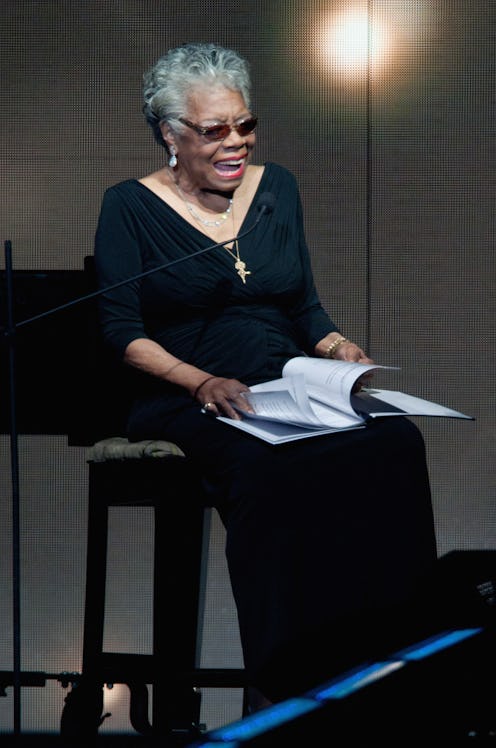Today we lost a phenomenal woman. Maya Angelou's honesty about racism, feminism, injustice, love, and, of course, self-acceptance, is the stuff of greatness. You don’t often find all those topics in one writer, but Angelou managed to pull it off, and those of us who read her work were forever changed as a result.
As a writer, Maya Angelou awakened something in me when I was on the brink of womanhood and desperately needed to find my own voice. Reading her writing taught me not only about the woman I wanted to become, but also about the kind of writer I wanted to be.
Although most of us will never be great writers like Maya Angelou, with her words and inspiration, each and every one of us can take her writing tips to heart. Here is some of Maya Angelou's best advice on writing.
1. ON LANGUAGE:
“When I am writing, I am trying to find out who I am, who we are, what we're capable of, how we feel, how we lose and stand up, and go on from darkness into darkness. I'm trying for that. But I'm also trying for the language. I'm trying to see how it can really sound. I really love language. I love it for what it does for us, how it allows us to explain the pain and the glory, the nuances and delicacies of our existence. And then it allows us to laugh, allows us to show wit. Real wit is shown in language. We need language.”
From Paris Review Interview, (2001) by George Plimpton
2. ON MEMOIRS:
"If I say it happened, it happened, even if only in my mind. I promised myself that I would write as well as I can, tell the truth, not to tell everything I know, but to make sure that everything I tell is true, as I understand it."
From The Daily Beast Interview, (2013) by Noah Charney
3. ON MAKING A LASTING IMPACT:
4. ON CONSISTENTLY TRYING:
"What I try to do is write. I may write for two weeks 'the cat sat on the mat, that is that, not a rat.' And if might be just the most boring and awful stuff. But I trying. When I'm writing, I write. And then it's as if the muse is convinced that I'm serious and says, 'Okay. Okay. I'll come.'"
5. ON CONSIDERING THE READER:
"Easy reading is damn hard writing. But if it’s right, it’s easy. It’s the other way round, too. If it’s slovenly written, then it’s hard to read. It doesn’t give the reader what the careful writer can give the reader."
From The Daily Beast Interview, (2013) by Noah Charney
6. ON HAVING WRITING QUIRKS:
"When I write, I tend to twist my hair. Something for my small mind to do, I guess. When my husband would come into the room, he’d accuse me, and say, 'You’ve been writing!' As if it was a bad thing. He could tell because of my hair, so I learned to hide my hair with a turban of some sort."
From The Daily Beast Interview, (2013) by Noah Charney
7. ON THE TRUTH:
“There is no greater agony than bearing an untold story inside you.”
8. ON THE POWER OF WRITING:
“I've learned that people will forget what you said, people will forget what you did, but people will never forget how you made them feel.”
As quoted in 'Worth Repeating: More Than 5,000 Classic and Contemporary Quotes' (2003) by Bob Kelly
9. ON CREATIVE JUICES:
"You can’t use up creativity. The more you use, the more you have."
As quoted in 'Conversations with Maya Angelou' (1989) by Jeffrey M. Elliot
10. ON TECHNIQUE:
"I try to remember times in my life, incidents in which there was the dominating theme of cruelty, or kindness, or generosity, or envy, or happiness, glee . . . perhaps four incidents in the period I’m going to write about. Then I select the one that lends itself best to my device and that I can write as drama without falling into melodrama."
From Paris Review Interview (1990) by George Plimpton
11. ON PERSONAL BEST:
"I know when it’s the best I can do. It may not be the best there is. Another writer may do it much better. But I know when it’s the best I can do. I know that one of the great arts that the writer develops is the art of saying, No. No, I’m finished. Bye. And leaving it alone. I will not write it into the ground. I will not write the life out of it. I won’t do that."
From Paris Review Interview (1990) by George Plimpton
